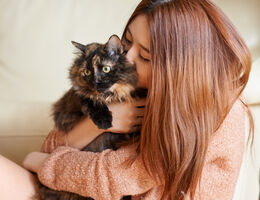
Feb. 13, 2025—While human illness from bird flu is still rare, this virus can infect other mammals—including your beloved pet cats. Here's how to keep them safe.
Not just for the birds
The current "bird flu" is a strain of an avian influenza A virus called H5N1. It's been infecting bird populations around the world. It's also affected mammals. That includes cows—and cats.
The H5N1 flu was first found in U.S. dairy cattle in March 2024. After that, domestic cats on various farms tested positive for the virus too.
While cases in other domestic and wild mammals have been reported, cats appear to be very susceptible to severe illness when infected. Symptoms strike quickly, frequently leading to death.
Spot the symptoms
In cats, symptoms of the H5N1 flu include:
- Fever.
- Lethargy or severe depression.
- Heavy discharge from the nose or eyes.
- Breathing difficulties.
- Coughing or sneezing.
- Neurological issues like tremors, seizures, blindness, circling or inability to control their body's movements (ataxia).
- Diarrhea.
The American Veterinary Medical Association (AVMA) advises calling a vet immediately if you suspect your cat might have bird flu. That lets clinic staff prepare to care for your pet when you arrive.
Keep your kitty—and yourself—safe
Cats can catch H5N1 from contact with infected wild birds, domestic poultry and other animals. Exposure to people who work on farms with infected poultry or dairy cattle also spreads the disease to cats.
Cats also catch the flu from food, warns the AVMA. Unpasteurized dairy products such as raw cream and milk have spread the disease. And in December 2024, raw cat food made by Northwest Naturals was recalled after it tested positive for H5N1.
To protect your pet:
- Keep cats away from sick or dead birds. The best way? Keep them inside.
- Don't feed cats raw milk or meat. Thoroughly cook raw meat cat food and only give cats pasteurized milk or cream.
People can catch the H5N1 flu too. Be sure to:
- Wash your hands after handling an outdoor cat, poultry, livestock, wild birds or other potentially infected animals.
- Not drink raw milk or unpasteurized dairy products. Heat kills the H5N1 virus, so choose pasteurized dairy products like milk, soft cheeses and ice cream instead.
- Thoroughly cook eggs, poultry and beef.
People who work with animals or hunt wild game should take extra precautions.
It's not common, but cats have been able to spread the H5N1 flu to humans. If your cat is sick, play it safe:
- Limit their contact with immunocompromised people.
- Monitor your pets and family for symptoms within 10 days of exposure. Report any human illness to your local public health department.
One more important tip
Handwashing is a powerful way to protect yourself and your loved ones from germs, such as the H5N1 flu. For the best benefits, make sure you're doing it right.
Sources
- American Animal Hospital Association. "H5N1 Influenza in Cats: Transmission, Diagnosis and Prevention." https://www.aaha.org/trends-magazine/publications/h5n1-influenza-in-cats-transmission-diagnosis-and-prevention.
- American Veterinary Medical Association. "Avian Influenza A (H5N1) in Cats." https://www.avma.org/resources-tools/animal-health-and-welfare/animal-health/avian-influenza/avian-influenza-h5n1-cats.
- American Veterinary Medical Association. "Cat Deaths Linked to Bird Flu-Contaminated Raw Pet Food, Sparking Voluntary Recall." https://www.avma.org/news/cat-deaths-linked-bird-flu-contaminated-raw-pet-food-sparking-voluntary-recall.
- Centers for Disease Control and Prevention. "Prevention and Antiviral Treatment of Avian Influenza A Viruses in People." https://www.cdc.gov/bird-flu/prevention/index.html.
- Centers for Disease Control and Prevention. "What Causes Bird Flu in Pets and Other Animals." https://www.cdc.gov/bird-flu/virus-transmission/avian-in-other-animals.html.
- Centers for Disease Control and Prevention. "What Causes Bird Flu Virus Infections in Humans." https://www.cdc.gov/bird-flu/virus-transmission/avian-in-humans.html.
- U.S. Food and Drug Administration. "FDA Outlines Ways to Reduce Risk of HPAI in Cats." https://www.fda.gov/animal-veterinary/cvm-updates/fda-outlines-ways-reduce-risk-hpai-cats.